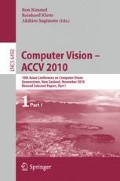Abstract
In this paper, we present an efficient algorithm for 3D object recognition in presence of clutter and occlusions in noisy, sparse and unsegmented range data. The method uses a robust geometric descriptor, a hashing technique and an efficient RANSAC-like sampling strategy. We assume that each object is represented by a model consisting of a set of points with corresponding surface normals. Our method recognizes multiple model instances and estimates their position and orientation in the scene. The algorithm scales well with the number of models and its main procedure runs in linear time in the number of scene points. Moreover, the approach is conceptually simple and easy to implement. Tests on a variety of real data sets show that the proposed method performs well on noisy and cluttered scenes in which only small parts of the objects are visible.
Access this chapter
Tax calculation will be finalised at checkout
Purchases are for personal use only
Preview
Unable to display preview. Download preview PDF.
References
Lamdan, Y., Wolfson, H.: Geometric Hashing: A General And Efficient Model-based Recognition Scheme. In: ICCV, pp. 238–249 (1988)
Ballard, D.H.: Generalizing the Hough Transform to Detect Arbitrary Shapes. Pattern Recognition 13, 111–122 (1981)
Mian, A.S., Bennamoun, M., Owens, R.A.: Three-Dimensional Model-Based Object Recognition and Segmentation in Cluttered Scenes. IEEE TPAMI 28, 1584–1601 (2006)
Johnson, A., Hebert, M.: Using Spin Images for Efficient Object Recognition in Cluttered 3D Scenes. IEEE TPAMI 21, 433–449 (1999)
Hetzel, G., Leibe, B., Levi, P., Schiele, B.: 3D Object Recognition from Range Images Using Local Feature Histograms. In: CVPR, pp. 394–399 (2001)
Frome, A., Huber, D., Kolluri, R., Bülow, T., Malik, J.: Recognizing Objects in Range Data Using Regional Point Descriptors. In: Pajdla, T., Matas, J(G.) (eds.) ECCV 2004. LNCS, vol. 3023, pp. 224–237. Springer, Heidelberg (2004)
Gelfand, N., Mitra, N., Guibas, L., Pottmann, H.: Robust Global Registration. In: Eurographics Symposium on Geometry Processing, pp. 197–206 (2005)
Zaharescu, A., Boyer, E., Varanasi, K., Horaud, R.: Surface Feature Detection and Description with Applications to Mesh Matching. In: CVPR, pp. 373–380 (2009)
Sun, J., Ovsjanikov, M., Guibas, L.J.: A Concise and Provably Informative Multi-Scale Signature Based on Heat Diffusion. Comput. Graph. Forum 28, 1383–1392 (2009)
Matei, B., Shan, Y., Sawhney, H.S., Tan, Y., Kumar, R., Huber, D.F., Hebert, M.: Rapid Object Indexing Using Locality Sensitive Hashing and Joint 3D-Signature Space Estimation. IEEE TPAMI 28, 1111–1126 (2006)
Winkelbach, S., Molkenstruck, S., Wahl, F.M.: Low-Cost Laser Range Scanner and Fast Surface Registration Approach. In: Proceedings of 28th DAGM Symposium Pattern Recognition, pp. 718–728 (2006)
Fischler, M.A., Bolles, R.C.: Random sample consensus: a paradigm for model fitting with applications to image analysis and automated cartography. Commun. ACM 24, 381–395 (1981)
Wang, H., Suter, D.: Robust Adaptive-Scale Parametric Model Estimation for Computer Vision. IEEE TPAMI 26, 1459–1474 (2004)
Wang, H., Mirota, D., Hager, G.D.: A Generalized Kernel Consensus-Based Robust Estimator. IEEE TPAMI 32, 178–184 (2010)
Chen, C.S., Hung, Y.P., Cheng, J.B.: RANSAC-Based DARCES: A New Approach to Fast Automatic Registration of Partially Overlapping Range Images. IEEE TPAMI 21, 1229–1234 (1999)
Schnabel, R., Wahl, R., Klein, R.: Efficient RANSAC for Point-Cloud Shape Detection. Comput. Graph. Forum 26, 214–226 (2007)
Aiger, D., Mitra, N.J., Cohen-Or, D.: 4-points Congruent Sets for Robust Pairwise Surface Registration. ACM Trans. Graph. 27 (2008)
Shan, Y., Matei, B., Sawhney, H.S., Kumar, R., Huber, D.F., Hebert, M.: Linear Model Hashing and Batch RANSAC for Rapid and Accurate Object Recognition. In: CVPR, pp. 121–128 (2004)
Author information
Authors and Affiliations
Editor information
Editors and Affiliations
Rights and permissions
Copyright information
© 2011 Springer-Verlag Berlin Heidelberg
About this paper
Cite this paper
Papazov, C., Burschka, D. (2011). An Efficient RANSAC for 3D Object Recognition in Noisy and Occluded Scenes. In: Kimmel, R., Klette, R., Sugimoto, A. (eds) Computer Vision – ACCV 2010. ACCV 2010. Lecture Notes in Computer Science, vol 6492. Springer, Berlin, Heidelberg. https://doi.org/10.1007/978-3-642-19315-6_11
Download citation
DOI: https://doi.org/10.1007/978-3-642-19315-6_11
Publisher Name: Springer, Berlin, Heidelberg
Print ISBN: 978-3-642-19314-9
Online ISBN: 978-3-642-19315-6
eBook Packages: Computer ScienceComputer Science (R0)

